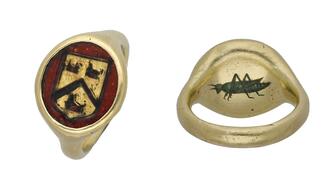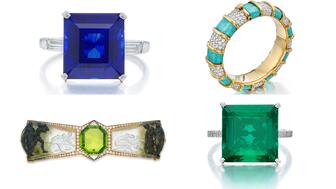The ‘Up System’ in Retail: Foolish or Fair?
Does having salespeople take turns waiting on customers make sense for jewelers, their employees, or their customers? Peter Smith opines.

If I was so inclined, my consulting business for suppliers and retailers could exist on a diet of phone calls, emails, and Teams calls.
However, I’d rather give up my first born (sorry, Ronan, someone’s gotta take one for the team!) than commit to a life spent in an office, without visiting customers.
You have to go to the source and breathe the oxygen on the front lines. There is no substitute for engaging with retail sales personnel in person, hearing about their challenges and issues, and observing the way they go about their business, be it good or bad.
I was reminded of this last week when, after I had completed my Sales Masterclass, a conversation ensued about the “Up System,” the practice of having all available salespeople take turns engaging with visiting customers.
If you, for example, have five salespeople, each salesperson has the opportunity to engage with every fifth customer, sort of like the Golden State Warriors having Steph Curry taking every fifth shot, or Kansas City Chiefs quarterback Patrick Mahomes taking every 11th snap.
OK, I confess to indulging in hyperbole there, but just a little.
A comment from a salesperson really got me thinking about how misunderstood the Up System is. He said, “We do it because it’s the fair thing to do!”
But who is it fair to? Is it fair to the business? Is it fair to the most talented salespeople? Is it fair to the least talented salespeople?
And, most importantly, is it fair to the customers?
In this case, the salesperson believed it was fair because he is fundamentally a decent man. His empathy was on full display, and I sensed a real sincerity in his sentiment.
Most of us can relate to the basic premise of fairness. We like an environment where our salespeople feel happy, where Pandora is always playing our favorite songs, and where the scent of baking chocolate-chip cookies constantly invigorates our olfactory senses. Alas…
Let’s examine the four questions.
1) Is it fair to the business?
If you believe your business exists for reasons unrelated to commerce, please stop reading now. The rest of this column will do nothing to make you feel good about me or you, and it is highly unlikely that my rationale will change your view that you are either a museum, or a benevolent charity.
The rest of you should read on.
Businesses exist to do business. For clarity’s sake, that means profitable sales. It’s what enables us to pay staff, pay vendors, keep the lights on, pay the rent or mortgage, market the business, and pay our taxes. It is, at its most fundamental level, the stuff that fuels a business’ very existence.
It should not be “fairness” that dictates our sales infrastructure, but what gives the business the very best opportunity for success.
However well-intentioned, any system that conspires to relegate the most talented salespeople to an equal footing with the least talented salespeople is not fair to the business. It is reductive and counterintuitive.
If you have traditionally deployed the Up System, look at your historic sales results. Are they equal across all salespeople, or are certain people consistently performing at a higher level, and others consistently underperforming despite the Up System?
That difference is talent, and those top performers are operating at that level despite your best efforts at leveling the playing field.
2) Is it fair to the most talented salespeople?
For clarity, the most talented salespeople are the folks who sell the most on a consistent basis year in and year out. They are the most productive people on your team regardless of your compensation plan or your stance on using the Up System.
They are the people you rely on most to deliver results when you’re having a tough week or month.
When you sit down to sketch out your goals forecast, they carry the biggest chunks of it and they overdeliver time and again.
In a world of declining foot traffic, your best salespeople drive more customers into the store through their own outreach efforts and they convert more of them at a higher average ticket than their less accomplished colleagues.
When the going gets tough, they willingly accept the pressure to make sales happen and to pull the proverbial rabbit from the hat.
They are intrinsically motivated to sell, and they fundamentally believe the customer is better off for having done business with them.
To paraphrase Apple’s Tim Cook, the most talented salespeople believe their role is to give you something you didn’t think you needed and then, having purchased it, you wonder how you ever lived without it.
3) Is it fair to the least talented salespeople?
The least talented salespeople, at best, are motivated by a desire to serve, not sell. Sales are, for too many of them, nice to have but ultimately secondary to delivering pleasant service and interesting (to them at least) product information.
They believe the customer will tell them if he or she wants to buy (no need to be pushy) and you could build monuments to memorialize the number of customers who tell them they will “be back” after a lovely interaction and, of course, never return.
No one can give a salesperson the motivation to be successful in sales and there is a very good reason why your least talented salespeople consistently underperform their colleagues. If you put pressure on them to perform (you know, sell stuff), they are ill-equipped to deal with that kind of burden.
If you don’t believe me, post your sales results in your backroom and watch how your lowest performers react. You’ll have introduced a level of stress and anxiety they will have great difficulty coping with.
Just as sports teams and bands need different kinds of players, sales teams need different personalities to make the whole greater than the sum of its parts. But at the end of the day, they all need to be in the correct position.
There’s a reason coaches don’t ask linemen to play quarterback, or bands don’t ask their bass player to play lead guitar.
4) Is it fair to your customers?
Psychologists believe we’re only aware of 5 percent of our cognitive function, and yet we see far too many salespeople and business owners believing that it’s all about what the customer tells us.
Customers are under no obligation to tell you what they want, when they want it, or how much they want to spend. They may not even know that they want to spend money until we unlock that desire.
In “The New Rules of Retail,” Robin Lewis and Michael Dart wrote, “The most important moment in retailing is the moment when a customer’s dream can be tipped into reality—the moment of purchase.”
The dopamine rush customers get from buying beautiful jewelry is the best measure of customer satisfaction. The most talented salespeople possess the skill to consistently unlock that deep-rooted, and often unconscious, desire.
We should reduce their cognitive load by cutting back on taxing questions and meaningless product information and, instead, connecting with them emotionally. That requires deploying your most talented salespeople at every opportunity.
Be clear about your expectations for your entire sales team and make no apology for facilitating a process that puts your best people in front of customers more often than your weaker salespeople.
The former will thank you for it, your customers will thank you for it, it is the right thing to do for your business, and you will have removed some of the performance stress for the folks on your team not best equipped to consistently deliver results.
Happy retailing!
The Latest

The heist happened in Lebec, California, in 2022 when a Brinks truck was transporting goods from one show in California to another.

The 10-carat fancy purple-pink diamond with potential links to Marie Antoinette headlined the white-glove jewelry auction this week.

The Starboard Cruises SVP discusses who is shopping for jewelry on ships, how much they’re spending, and why brands should get on board.

The Seymour & Evelyn Holtzman Bench Scholarship from Jewelers of America returns for a second year.

The historic signet ring exceeded its estimate at Noonans Mayfair’s jewelry auction this week.


To mark the milestone, the brand is introducing new non-bridal fine jewelry designs for the first time in two decades.

The gemstone is the third most valuable ruby to come out of the Montepuez mine, Gemfields said.

The countdown is on for the JCK Las Vegas Show and JA is pulling out all the stops.

Founder and longtime CEO Ben Smithee will stay with the agency, transitioning into the role of founding partner and strategic advisor.

Associate Editor Natalie Francisco shares 20 of her favorite pieces from the jewelry collections that debuted at Couture.

The top lot was a colorless Graff diamond, followed by a Burmese ruby necklace by Marcus & Co.

Gizzi, who has been in the industry since 2001, is now Jewelers of America’s senior vice president of corporate affairs.

Luca de Meo, a 30-year veteran of the auto industry, will succeed longtime CEO François-Henri Pinault.

Following visits to Vegas and New York, Botswana’s minerals minister sat down with Michelle Graff to discuss the state of the diamond market.

The “Your Love Has the Perfect Ring” campaign showcases the strength of love and need for inclusivity and representation, the jeweler said.

The former De Beers executive is the jewelry house’s new director of high jewelry for the Americas.

The New York Liberty forward is the first athlete to represent the Brooklyn-based jewelry brand.

Take a bite out of the 14-karat yellow gold “Fruits of Love Pear” earrings featuring peridots, diamond stems, and tsavorite leaves.

The one-day virtual event will feature speakers from De Beers, GIA, and Gemworld International.

The California-based creative talks jewelry photography in the modern era and tackles FAQs about working with a pro for the first time.

Al Capone’s pocket watch also found a buyer, though it went for less than half of what it did at auction four years ago.

The foundation has also expanded its “Stronger Together” initiative with Jewelers for Children.

Assimon is the auction house’s new chief commercial officer.

The De Beers Group CEO discusses the company’s new “beacon” program, the likelihood diamonds will be exempt from tariffs, and “Origin.”

The Danish jewelry giant hosted its grand opening last weekend, complete with a Pandora pink roulette wheel.

Industry veteran Anoop Mehta is the new chairman and independent director of the IGI board.

The winners of the inaugural “Kering Generation Award x Jewelry” are student Lee Min Seo and China-based startup Ianyan.



























